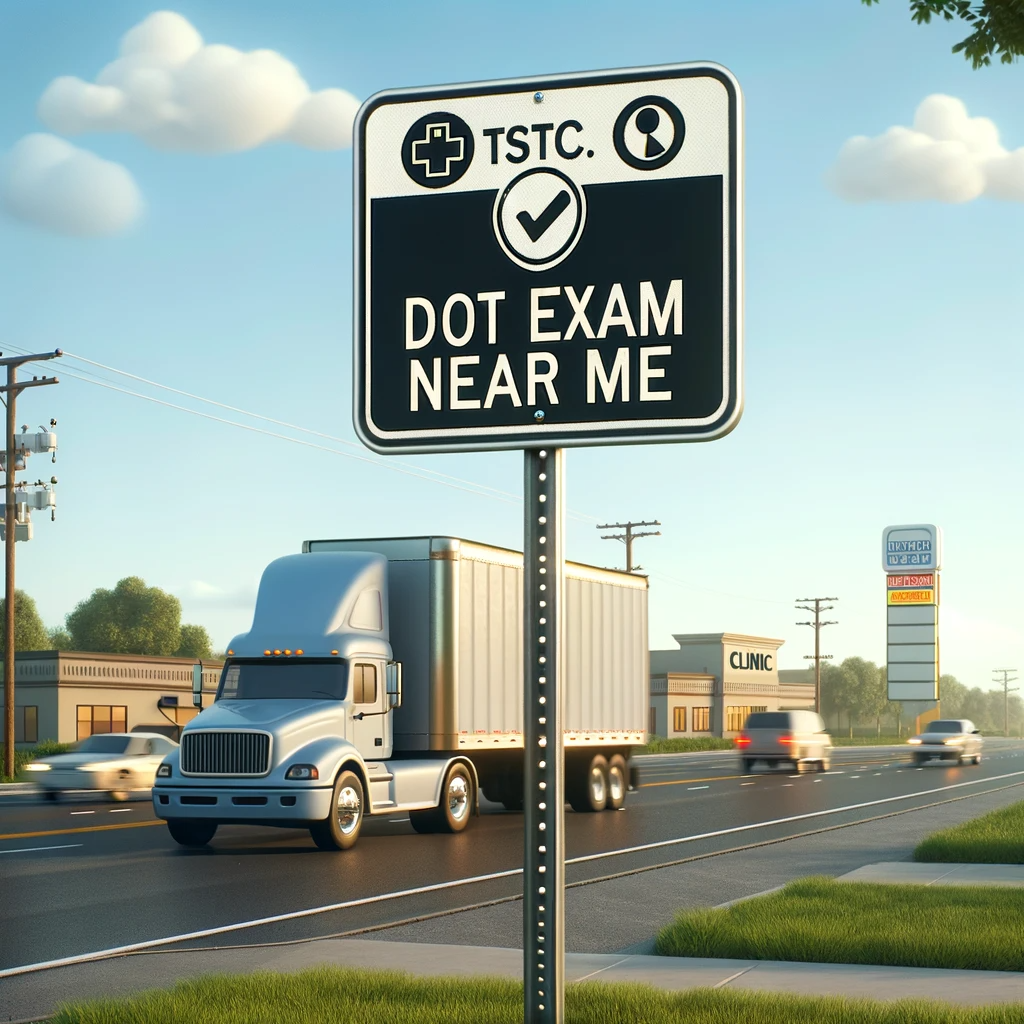Introduction
For professional truck drivers, maintaining health and meeting safety standards are paramount. Chiropractors (DCs) are among the certified medical examiners who can perform DOT physicals. A key component of ensuring that truck drivers are fit for the road is the DOT physical exam for commercial drivers. Mandated by the Federal Motor Carrier Safety Administration (FMCSA), the DOT physical is essential for obtaining and maintaining a commercial driver’s license (CDL). This comprehensive health examination mandated by federal regulations ensures that drivers can safely operate a commercial motor vehicle (CMV). At the Charlotte DOT Exam Center, we specialize in providing thorough and efficient DOT physicals to help you
Understanding the DOT Physical Exams For Commercial Drivers
The DOT physical is a health examination mandated by the Department of Transportation (DOT) to ensure that commercial vehicle drivers are physically qualified to operate CMVs safely. Certified medical examiners are responsible for performing DOT physicals according to DOT criteria, making this exam essential for obtaining and renewing a DOT medical card, which is a prerequisite
Key Components of the DOT Physical Exam For Commercial Drivers
- Medical History Review: The exam begins with a detailed review of your medical history, including any past or current health conditions, surgeries, medications, and lifestyle factors such as smoking and alcohol consumption. It’s important to be honest and thorough during this part of the exam.
- Vital Signs Check: Your blood pressure, pulse rate, and body mass index (BMI) are measured. High blood pressure and irregular heartbeats can be red flags that require further evaluation.
- Vision and Hearing Tests:
- Vision Test: This ensures you meet the required vision standards, either naturally or with corrective lenses. Peripheral vision and the ability to distinguish colors are also tested.
- Hearing Test: A hearing test checks if you can hear a forced whisper from five feet away, ensuring you can respond to sounds on the road. If you use hearing aids, bring them to the exam.
- Physical Examination: This comprehensive physical exam checks your overall health, including heart, lungs, abdomen, and musculoskeletal system. The medical examiner looks for any signs of muscle weakness, neurological issues, or other health concerns that could impair your driving ability.
- Urine Sample: A urinalysis is performed to check for underlying conditions such as diabetes and kidney disease. This test is also part of the DOT physical requirements to ensure you are not using controlled substances.
- Special Considerations:
- Sleep Apnea: If you have symptoms or a history of sleep apnea, you may need to undergo a sleep apnea test and possibly use a CPAP machine to manage the condition.
- Insulin-Treated Diabetes: Drivers with insulin-treated diabetes must meet specific criteria and provide additional documentation to ensure their condition is well-managed.
The Role of the Medical Examiner
Certified medical examiners play a crucial role in conducting DOT physical exams. They are trained to understand the specific health requirements for commercial drivers and ensure that each driver meets the necessary standards. At the Charlotte DOT Exam Center, our certified medical examiners are experienced in performing DOT physicals and providing the necessary documentation, such as the medical examiner’s certificate and the DOT medical card. The medical examiner’s certificate (MEC) is issued upon successful completion of the DOT physical exam and is crucial for maintaining a CDL.
Preparing for Your DOT Physical
To ensure a smooth and successful DOT physical, here are some preparation tips:
- Bring Necessary Documents: Include your driver’s license, a list of current medications, and your medical history.
- Stay Hydrated and Eat Healthily: Avoid excessive caffeine and salty foods before your exam to help keep your blood pressure in check.
- Manage Medications: Take your medications as prescribed, and bring them with you. If you have any medical conditions, such as hypertension or diabetes, ensure they are well-managed and under control.
- Get a Good Night’s Sleep: Being well-rested can help keep your blood pressure in check and ensure you are at your best for the exam.
Common Health Concerns
Several health conditions can impact your ability to pass the DOT physical. Here are some common concerns and how they are addressed:
- High Blood Pressure: Regular monitoring and management of your blood pressure are essential. The DOT physical includes multiple readings to ensure an accurate measurement.
- Vision and Hearing: Ensure your vision and hearing are up to standard. Corrective lenses and hearing aids should be in good condition and used as needed.
- Sleep Apnea: Proper diagnosis and treatment with a CPAP machine can help manage this condition and keep you fit for driving.
- Chronic Conditions: Conditions like diabetes and heart disease must be well-managed with regular check-ups and medication.
Conclusion
The DOT physical exam is a vital part of maintaining the safety and health of commercial drivers. At the Charlotte DOT Exam Center, we are committed to providing comprehensive and efficient DOT physicals to help you stay compliant and healthy. For an appointment, call 704-544-3494 and see one of our certified medical examiners. We are located at 8415 Pineville-Matthews Road, Charlotte NC 28226. Our examiners are available Monday through Friday from 9 AM to 5 PM and on Saturday from 9 AM to 12 noon. The cost is $70.00 and includes the required urinalysis and a laminated card for your wallet upon successful completion.
Stay tuned for the next section where we dive deeper into specific DOT physical requirements and answer common FAQs.
Detailed Breakdown of DOT Physical Requirements 
Understanding the specific requirements of a DOT physical exam can help you better prepare and ensure you meet all the necessary criteria. Here’s a detailed look at what to expect during your examination and the standards you need to meet.
Vision Requirements
Good vision is crucial for safe driving. During your DOT physical, your vision will be tested to ensure it meets the following standards:
- Visual Acuity: You must have at least 20/40 vision in each eye, with or without corrective lenses.
- Peripheral Vision: Your peripheral vision must be at least 70 degrees in the horizontal meridian in each eye.
- Color Vision: You must be able to distinguish the colors of traffic signals and devices showing standard red, green, and amber.
Hearing Requirements
Hearing is another critical aspect of safe driving. The hearing test during your DOT physical involves:
- Forced Whisper Test: You must be able to hear a forced whisper from at least five feet away, with or without a hearing aid.
- Audiometry Test: Alternatively, your hearing loss must not exceed an average hearing loss of 40 dB or more at 500 Hz, 1000 Hz, and 2000 Hz in your better ear, with or without a hearing aid.
Blood Pressure and Pulse Rate
Your blood pressure and pulse rate are important indicators of your cardiovascular health. The standards include:
- Blood Pressure: Ideally, your blood pressure should be below 140/90 mmHg. If it’s slightly higher, you might still pass but with a shorter certification period.
- Pulse Rate: Your pulse rate is checked for any irregularities or signs of cardiovascular disease.
Cardiovascular Health
The DOT physical exam includes a thorough check of your cardiovascular health to ensure you do not have any conditions that could impair your driving. This includes checking for:
- Heart Disease: Any history of heart disease, heart attack, or other cardiovascular conditions will be reviewed.
- Irregular Heartbeats: Any irregularities in your heartbeats will be noted and may require further investigation.
Respiratory Health
Your respiratory health is assessed to ensure you do not have any conditions that could affect your breathing while driving:
- Sleep Apnea: If you have a history of sleep apnea, you must provide proof that it is being managed, typically with a CPAP machine.
- Respiratory Dysfunction: Any chronic respiratory conditions will be evaluated to ensure they do not impair your ability to drive.
Neurological Health
Your neurological health is another crucial aspect of the DOT physical. The exam includes:
- Neurological Issues: Any history of seizures, epilepsy, or other neurological disorders will be reviewed.
- Muscle Weakness: The medical examiner will check for any signs of muscle weakness or conditions that could impair your driving ability.
The Role of Certified Medical Examiners
Certified medical examiners are responsible for performing DOT physicals and ensuring that all commercial drivers meet the required health standards. These professionals are trained to understand the specific needs of commercial drivers and the regulations set by the FMCSA.
At the Charlotte DOT Exam Center, our certified medical examiners provide thorough and compassionate care to help you meet these standards. They are well-versed in the latest DOT physical requirements and committed to ensuring that each driver is physically qualified to operate a commercial vehicle safely.
Common Health Concerns Addressed
During your DOT physical, several common health concerns are addressed to ensure you meet the necessary standards:
- High Blood Pressure: Regular monitoring and proper management are essential. We provide multiple readings to ensure accurate measurement.
- Diabetes: Drivers with insulin-treated diabetes must provide documentation to show that their condition is well-managed.
- Vision and Hearing Issues: Ensure your corrective lenses or hearing aids are in good condition and used as needed.
DOT Medical Card and Certification
Once you pass your DOT physical, you will receive a DOT medical card, also known as a medical examiner’s certificate (MEC). This certificate is essential for maintaining your CDL and must be renewed periodically. If you have any medical conditions that require monitoring, you may receive a certificate with a shorter validity period.
Conclusion
The DOT physical exam is an essential part of ensuring the safety and health of commercial drivers. At the Charlotte DOT Exam Center, we are dedicated to providing comprehensive and efficient DOT physicals to help you stay compliant and healthy on the road. For an appointment, call 704-544-3494 and see one of our certified medical examiners. We are located at 8415 Pineville-Matthews Road, Charlotte NC 28226. Our examiners are available Monday through Friday from 9 AM to 5 PM and on Saturday from 9 AM to 12 noon. The cost is $70.00 and includes the required urinalysis and a laminated card for your wallet upon successful completion.
Frequently Asked Questions
What does a North Carolina DOT physical consist of?
A North Carolina DOT physical includes a review of your medical history, vision and hearing tests, blood pressure and pulse rate checks, and a comprehensive physical examination. A urine sample is also taken to check for underlying health conditions.
How much is a DOT physical in NC?
The cost of a DOT physical in North Carolina typically ranges from $60 to $100. At the Charlotte DOT Exam Center, the cost is $70.00, including the required urinalysis and a laminated DOT medical card.
What does a DOT physical consist of in California?
A DOT physical in California includes similar components to those in other states: a medical history review, vision and hearing tests, blood pressure and pulse rate checks, a physical examination, and a urine sample.
Can I keep my CDL without a medical card in North Carolina?
No, you cannot keep your CDL without a valid DOT medical card in North Carolina. The DOT medical card is a mandatory requirement for maintaining your CDL.
What is required for a DOT physical in North Carolina?
For a DOT physical in North Carolina, you need to provide your driver’s license, a list of current medications, and your medical history. The physical includes vision and hearing tests, blood pressure and pulse rate checks, a physical examination, and a urine sample.
How much does an NC DOT physical cost?
The cost of an NC DOT physical typically ranges from $60 to $100. At the Charlotte DOT Exam Center, the cost is $70.00.
What happens if you let your DOT medical card expire in NC?
If your DOT medical card expires in North Carolina, you may be disqualified from driving a commercial vehicle until you renew your certification. It’s essential to keep your DOT medical card up to date to avoid any interruptions in your driving career.
Where do I send my DOT medical card in NC?
In North Carolina, you need to submit your DOT medical card to the North Carolina Division of Motor Vehicles (NCDMV). You can submit it online, by mail, or in person at a DMV office.
Where can you find the medical standards for CMV operation?
The medical standards for CMV operation are available on the FMCSA website. These standards outline the health requirements that commercial drivers must meet to be physically qualified to drive.
What does a physical consist of?
A physical exam typically includes a review of your medical history, a check of vital signs (such as blood pressure and pulse rate), a vision and hearing test, a physical examination of various body systems, and often a urine sample.
Will I lose my CDL if my medical card expires in NC?
Yes, if your DOT medical card expires in North Carolina, you may lose your CDL until you renew your certification. It’s important to keep your medical card current to maintain your CDL.
What does a DOT urinalysis test for?
A DOT urinalysis tests for underlying health conditions such as diabetes and kidney disease. It is also used to check for controlled substances.
What does a DOT physical consist of in Ohio?
A DOT physical in Ohio includes a medical history review, vision and hearing tests, blood pressure and pulse rate checks, a physical examination, and a urine sample.
What does a DOT physical consist of in Texas?
A DOT physical in Texas includes a medical history review, vision and hearing tests, blood pressure and pulse rate checks, a physical examination, and a urine sample.
Who needs a DOT medical card in PA?
In Pennsylvania, all commercial drivers operating a CMV are required to have a valid DOT medical card.
Who needs a DOT medical card in NJ?
In New Jersey, all commercial drivers operating a CMV are required to have a valid DOT medical card.
Can I keep my CDL without a medical card in PA?
No, you cannot keep your CDL without a valid DOT medical card in Pennsylvania. The DOT medical card is a mandatory requirement for maintaining your CDL.
How to pass a DOT blood pressure test?
To pass a DOT blood pressure test, ensure you maintain a healthy lifestyle, including regular exercise, a balanced diet, and stress management. Avoid excessive caffeine and salt before the exam and take prescribed medications as directed.
How much is a DOT physical in CT?
The cost of a DOT physical in Connecticut typically ranges from $60 to $100, depending on the provider.
What does a DOT physical consist of in Illinois?
A DOT physical in Illinois includes a medical history review, vision and hearing tests, blood pressure and pulse rate checks, a physical examination, and a urine sample.
I am the administrator for the Charlotte DOT Exam facility, located in Charlotte NC. I oversee the facility services providing DOT exams in accordance with the standards of the FMCSA. We also provide DOT drug testing with MRO support when required. Drug testing can also be done for non-DOT exams such as pre-employment. In order to minimize wait times, I always encourage our clients to contact us first and make an appointment.
I would also suggest that each individual wanting to test for the CDL health card read the article “Preparing For Your DOT Exam” as it lists several things to bring to the test, such as CPAP usage reports and medicine lists.
…




 For non-CDL operators, understanding and complying with DOT regulations is not merely about legal adherence; it’s about ensuring the safety and security of the driver, the vehicle, and the public. Staying informed and compliant with these requirements is an ongoing responsibility that demands diligence and commitment.
For non-CDL operators, understanding and complying with DOT regulations is not merely about legal adherence; it’s about ensuring the safety and security of the driver, the vehicle, and the public. Staying informed and compliant with these requirements is an ongoing responsibility that demands diligence and commitment.